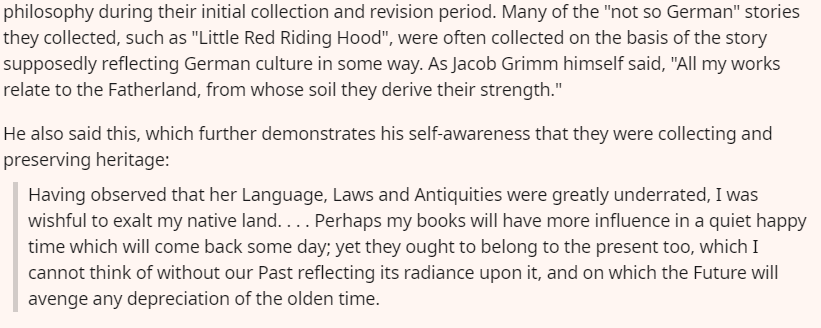Some people have said they think it's "tasteless" for people to compare real-life events with those portrayed in fictional media, but I think people should remember that the narratives people consume & tell themselves are inextricably linked with how they view the world. (1/)
So let me explain a couple of things: When I was an undergrad, I did my senior thesis on fairy tales and how they help contribute to the formation of national identity. (2/)
In my research, I examined the roots and rise of romantic nationalism across Europe and how nationalist theory was both a direct and explicit justification given for the collection of fairy tales and folklore. (3/)
The lessons I learned can be extrapolated and applied to all fictional (and non-fictional, for that matter) media, not just the stories we tell to children. Here's three of them: (4/)
Lesson 1: People will use nationalist narratives to create a cohesive story of what society "should" look like. Finnish scholars saw romantic nationalist Johann Herder’s work as a guide to avoid Russification by “turning to their past to find strength for the future."(5/)
Meanwhile, Asbjørnsen & Moe over in Norway published their folktale collection specifically for the purpose of “recapturing the national soul and to put the country back on its own cultural foundation” after being under substantial foreign influence for so long. (6/)
And of course, the Brothers Grimm were uh...*super* explicitly and keenly aware of nationalist sentiment; in fact, it's one of the principal reasons they collected and published tales in the first place. (7/)
Fairy tale collection began as and still remains an attempt by these nationalist scholars to preserve and create unified cultural narratives that exemplify what it truly means to be a member of that culture. (8/)
The point of Lesson 1 is that the media people choose to consume & the stories content creators choose to produce (and are allowed to produce by gatekeepers) are ultimately in conversation with this centuries-old question of "what does it mean to be a member of OUR society?" (9/)
Lesson 2: Authors draw on real-world events & politics (current and historical) to create their worlds, & fiction reflects reality because content creators and producers have an invested interest in socio-political commentary and critique of society as they experience it. (10/)
Fairy tales ultimately are no different than "A Modest Proposal" in that respect. "Hansel and Gretel" is a descriptive portrayal of the realities of famine; "Cinderella" & "The Girl Without Hands" are stories of surviving & thriving despite abusive home situations. (11/)
"Beauty and the Beast" & "Bluebeard" are competing narratives about the realities of young women marrying older men they've never or barely met. These stories describe circumstances that their tellers experienced or saw in their everyday lives. Modern media is no different. (12/)
The Handmaid's Tale functions as effective social critique, for example, because Margaret Atwood took the social and political realities she saw in both historical and contemporary society and transposed it, in exaggerated form, into a fictional narrative. (13/)
Star Wars happened b/c George Lucas looked at how democracies have historically eroded to form authoritarian dictatorships, saw connections & similarities between them, looked at contemporary society & saw the same problems, & then wrote a fictional story about it. (14/)
Authors draw on IRL events & politics to create their worlds. And these parallels are a 2-way street: readers use the media they consume to relate to the world around them. It's why issues of representation in fiction are so important to discuss. (15/)
Lesson 3: Discussing the similarities between fiction and reality does not minimize the real life events taking place, and people have ALWAYS used fiction to discuss, understand, and cope with the situations they see and experience in their daily lives. (16/)
Cinderella has been the ultimate wish-fulfillment story of millions of abuse survivors throughout world history: after a lifetime of surviving abuse & servitude, she gets to lead a happy life where she is treated kindly & respectfully with a man who loves her. (17/)
Fairy tales deal with incredibly real problems in a fantastic way, giving people a safe space to share, identify with, & understand these issues they may be personally experiencing, helping someone else work through, or interacting with. Contemporary media is no different. (18/)
To compare IRL events to Gilead or the Fall of the Galactic Republic does not indicate minimization of them; it means that you're drawing on the stories your society has produced (like all humans do) to attempt to explain, process, & cope with events happening around you. (19/)
Drawing parallels between fictional and IRL events is a well-established educational (& psychological) tactic to help children/young adults process, explain, and analyze IRL events. It's just as important for adults to continue doing it after being taught how as children. (20/)
Popular media is OFTEN used for this purpose (and always has been), because it can be helpful to identify or joke about similarities between a familiar fictional narrative and real-life events that may not be as familiar or easy to identify. (21/)
...basically, tl;dr: popular media has ALWAYS been used to draw parallels with, describe, or discuss real-life events, has ALWAYS been used to create societal narratives of "who belongs" & who doesn't, and has ALWAYS been used by authors to critique real-life events. (/end)
*Addition: I would like to note that all this being said, said discussions and comparisons can be done in both good and bad taste. Ex: I've seen more bad takes comparing Harry Potter with reality than I care to count. Take care to compare/contrast fiction vs. reality tastefully.

 Read on Twitter
Read on Twitter


